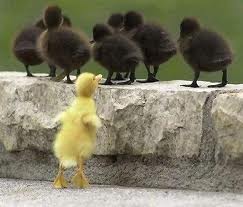The Power of our Words
This is part 3 of a series on classic concepts to understand Normalization and Inclusion.
The first was Norm Kunc| A Credo of Support
The second was about The difference between the words “Disability” and “Handicapped.”
Mayer Shevin wrote this classic poem. I’m hoping you’ll add your thoughts in the comments.
“The Language of Us and Them”
By Mayer Shevin, 1987.
We like things.
They fixate on objects.We try to make friends.
They display attention-seeking behaviors.We take a break.
They display off-task behavior.We stand up for ourselves.
They are non-compliant.We have hobbies.
They self-stim.We choose our friends wisely.
They display poor peer socialization.We persevere.
They perseverate.We love people.
They have dependencies on people.We go for walks.
They run away.We insist.
They tantrum.We change our minds.
They are disoriented and have short attention spans.We are talented.
They have splinter skills.We are human.
They are…….?
What do you think?
Okay, truth time.
Have you ever used any of these phrases?
Are we really different?
Is there a legitimate reason for the We versus They? the Us and Them ways of thinking?
Are these words:
more than just semantics
more than about insiders/outsiders
more than prejudice
more than stereotyping…
and everything about survival, inclusion, and being loved.
Thought Experiment
In Erving Goffman’s classic book, Stigma: Notes on the Management of Spoiled Identity (1963) he talks about social stigma and how words like we/us and they/them are ways we separate and distance ourselves from other people and what is happening.
Check out this recent article about abuse, neglect, and budget cuts in an institution in California.
California Watch slams State Institution | Neglect, Weak Oversight.
How do we decide if we will get involved or distance ourselves?
What makes us care, not care?
Think about how the social stigma of we, us, they, and them affects adults with autism and developmental disabilities.
Think about how social stigma affects our decisions.
If you have a son or daughter, a relative or neighbor in this institution, then this story is about “us and we”–it touches our lives.
If you care about people with disabilities, this story is also about “us and we” because the next story may affect our loved ones.
I hope you will share some of your thoughts and continue the discussion in the comments.
Keep Climbing: Onward and Upward
All my best,
Mary
Related Posts
Socially Constructed Attitudes| What do you see?
Test Questions| Segregation or Inclusion?
—

